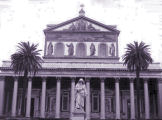earlier: A WORD IN SEASON
Monastic Lectionary For The Divine Office
Exordium Bools 1982
Fourth Week of Lent Year I Monday
 |
| Jewish High Priesthttp ://achristianpilgrim.wordpress.com/2012/02/10/christ-ever-living-to-intercede-for-us/ |
First
Reading From the letter to the Hebrews (7:11-28)
Responsory
Psalm 100:4; see Hebrews 7:17
The
Lord has sworn an oath he will not retract:
-
You are a priest for ever in the line of Melchizedek.
Melchizedek
was the first to offer sacrifice to God.
-
You are a priest for ever in the line of Melchizedek.
Second
Reading
From a letter by Saint Fulgentius of
Ruspe (Ep. 14, 36-37: CCL 91, 429-431)
This
extract from a letter written early in the sixth century by a writer who has
been called the best (Western) theologian of his time, teaches that it is through Christ that we make our prayer
and offer our sacrifice because it is his sacrificial death that has made our
offering acceptable to God the Father. The way we conclude our prayers shows
the equality of Father, Son, and Holy Spirit
Notice
that at the conclusion of our prayer we never
say "through the Holy Spirit," but rather "through Jesus Christ,
your Son. our Lord." Through
the mystery of the incarnation Jesus Christ became man, the mediator between
God and men. He is a priest for ever according to the order of
Melchizedek. By shedding his own blood he entered once and for all into the
Holy Place. He did not enter a place made by human hands, a mere type of the
true one; he entered heaven itself. where he is at God's right hand
interceding for us. Quite correctly, the Church continues to reflect this
mystery in her prayer.
It
was in regard to Christ's high-priestly office that the apostle Paul said: Through him, then, let us
always offer the sacrifice of praise to God, the fruit of lips that profess
belief in his name. We were once enemies of the Father, but have been
reconciled through the death of
Christ Through him then we offer our
sacrifice of praise, our prayer to God. He became our offering to the Father,
and through him our offering is now
acceptable. It is for this reason that the apostle Peter urges us to be
built up as living stones into a spiritual house, a holy priesthood to offer
spiritual sacrifices pleasing to God through Jesus Christ; and that is why we offer prayer to God
our Father through Jesus Christ our
Lord.
When
we speak of Christ's priesthood, what else do we mean but the incarnation. by
means of which the Son of God, though his state was divine, emptied himself
to assume the condition of a slave? As a slave, he humbled himself and
in obedience even accepted death. Though he possessed equality with the
Father, he became a little less than the angels. Always equal to the
Father, the Son became a little less because he became a man Christ lowered
himself when he emptied himself to assume the condition of a slave. It
was precisely this self-emptying, this acceptance of a servile condition. that
made him a little less than the angels.
By
this condition Christ, the only Son of God, became a priest, though he
continued to be God by nature. To him with the Father we offer our sacrifice.
Yet it is through him as our priest
that the sacrifice we now offer is holy, living, and pleasing to God. Indeed, if
Christ had not sacrificed himself for us, we could not offer any sacrifice, for
it is in him that our human nature becomes a redemptive offering. When we offer
our prayers through him. the eternal
priest, we profess our faith that he is truly our flesh and blood. Clearly the
Apostle refers to this when he says: Every high priest is taken from among
men. He is appointed to act on their behalf in their relationship to God; he is
to offer gifts and sacrifices to God.
We
do not, however, only say "your Son" when we conclude our prayer. We
also say "who lives and reigns with you in the unity of the Holy
Spirit" In this way we commemorate the natural unity of Father, Son, and
Holy Spirit It is clear, then, that the Christ who exercises a priestly role on
our behalf is the same Christ who enjoys a natural unity and equality with the
Father and the Holy Spirit
Responsory
Hebrews 4:15.14
Let
us approach the throne of grace with perfect confidence;
-
there we shall receive mercy
and
find grace to help us in time of need.
We
do not have a high priest
who
is incapable of understanding our weakness.
-
There we shall ...
SAINT QUOTE OF THE DAY
 |
Saint Fulgentius of Ruspe
"For the cup we drink is a participation in the blood of Christ, and the bread we break is a participation in the body of Christ. Because there is one loaf, we who are many are one body, since we all share the same bread. And so we pray that, by the same grace which made the Church Christ's body, all its members may remain firm in the unity of that body through the enduring bond of love."
http://faithofthefatherssaintquote.blogspot.co.uk/2010/12/saint-quote-saint-fulgentius-of-ruspe.html#.UUDjRRyePk0











